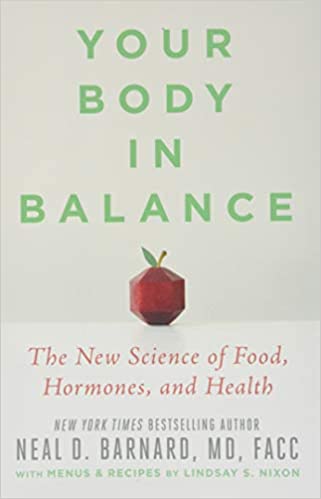
A swath of books on hormone health have been published in recent years. The thesis for most of them is that you can improve your health, lose weight and even reverse some diseases by balancing your hormones. And in many cases, as these books tell us, we can do so through changes to our lifestyles, as with exercise or diet.
These books are an important contribution to health education, as many people do not realize that their hormone levels are changeable, which could be a key to better health.
“Your Body in Balance” is a worthy addition to the field. It’s written by Dr. Neal D. Barnard, who has written fourteen other health and diet-related books, including the best-seller “The Cheese Trap,” which bummed the world out by shedding light on the chemically addictive power of cheese (he was right — the casein in cheese breaks down into casomorphins, which are mildly addictive).
The books is organized by health concerns—there is a chapter each on fertility, PMS, cancer (separate chapters for men and women), PCOS, menopause, ED, diabetes, thyroid, skin and hair, and moodiness and stress.
The advice for many of these issues is overlapping, so there is some repetition in the book. For many conditions, Dr. Barnard recommends veganism and removing fat and oil from the diet. As a vegetarian myself, I am a believer in the health benefits of eliminating meat. The value of eating a whole-food, plant-based diet is supported by a wealth of evidence. Avoiding fat, on the other hand, is more controversial.
He allows for fat in the form of avocados and nut foods in the recipes at the back of the book, but he suggests giving up all added oils. His reasons for doing so are not well-substantiated in this book. The main reason offered in the book is that the high calories in oils are not helpful to weight loss. He also mentions the anecdote of sisters Nina and Randa Nelson, who wrote the book “The Clear Skin Diet,” about how eliminating oil from their diets cleared their severe acne.
But vegans are already often low in omega-3s, critical for healthy brain function. He says that supplementing with EPA and DHA (they compose omega-3s) is “a reasonable decision,” but he does not firmly recommend them.
And no, not even olive oil or coconut oil are OK, according to Dr. Barnard.
Regarding his recommendation to avoid dairy, Dr. Barnard is more thorough. He explains the downsides of dairy go well beyond the negative healthy effects that have been in the popular press about the added synthetic hormones in most mass-produced dairy products. Many of us have learned to look for rBGH (recombinant bovine growth hormone) on milk and cheese labels.
Dr. Barnard goes further to explain that all milk products are made from—of course—lactating cows. Dairy cows are also usually pregnant, with elevated levels of cow estrogen that shows up in your food and can disrupt your own hormones. Their milk can also boost your levels of IGF-1, a growth hormone that is linked to breast and prostate cancer.
He goes further to explain the evidence against the naturally occurring milk sugars lactose and galactose, which are implicated in fertility problems and ovarian cancer.
The book concludes with a chapter on how to put all the recommendations together and make healthy habit changes. There are tips on how to cook without oil, and two weeks of recommended menus, plus 65 recipes.
Today’s diet trends (dare I call them “fads?”)—keto, butter in your coffee, the war on carbs, fish oil pills, EVOO – couldn’t be more opposite from the recommendations in this book. And that is its value—to question today’s accepted wisdom and get us to consider new evidence for the healthiest ways to eat and live.
Until science learns more, I’ll keep using olive oil in my salad dressing, but I am going to reduce my dairy consumption. “Your Body in Balance” is a valuable addition to your bookshelf; but take some of the extreme advice with a grain of salt. Actually, don’t, as Dr. Barnard says to limit salt as well.
